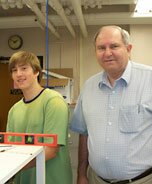TAKE ACTION
Contact Irene O’Mara (REAP Director) at (603) 228-4530 or email her at if you have an interest in learning more about establishing a program in your department.
AFFILIATE UNIVERSITIES
The REAP program places apprentice students into over 50 universities around the country.
The REAP Mentor
Mentors are the key to a successful REAP experience. Good mentors excite student interest and empower students to continue their education. Mentors are often renewed by nurturing the talents of their young protégé.
Dr. Robert Cody from Iowa State University writes: “I am firmly convinced that the program provides strong reinforcement for students interested in science and engineering as a career, and also provides high quality assistants for university research. I appreciate the opportunity to once again take part in the REAP program.”
The REAP experience connects students with excellent role models and the opportunity to interact with some of the best faculty in the country.
The Mentor is Key
Where practicable, the mentor should be a person whose primary duties are hands-on bench work so that the apprentice interfaces continually with the mentor. Each mentor should be involved in the apprentice selection process and make the final decision on the students that will be accepted. A university may be awarded more than one grant and, accordingly, a mentor may oversee more than one apprentice. Mentors are encouraged to maintain contact with apprentices throughout their college experience.
Dr. Joseph Stucki from the University of Illinois, has been involved in REAP for many years. He feels it is a great opportunity for high school students and it also gives him the opportunity to maintain contacts with local schools. Universities view REAP as an asset to their communities, enriching their campuses by bringing bright young students to interact with faculty and providing valuable support to research projects. Many graduate students and others assist the mentors in their summer experience.
Dr. R.O. Buckius from the University of Illinois writes: “The program provides a valuable mechanism for young people to become familiar with the engineering profession. This particular apprenticeship is an excellent example of how the program can broaden a young person’s goals.”
Reporting and Evaluation
Within thirty (30) days after conclusion of the apprenticeship, a narrative letter report is submitted on each student employed as part of the program. The report must indicate the type and level of work performed by the student and an evaluation of the student's performance as well as comments and suggestions on this effort.
Apprentice Selection Process
Student apprentices are selected for REAP via recommendations by high school teachers.
The basic criterion for selection of participants is the potential shown for pursuing careers in STEM. Factors considered in selecting apprentices:
1) previous demonstrated abilities and interests in science and engineering (for example, extracurricular technical activities such as science clubs and science fairs); and/or
2) potential for a successful career in the field as indicated from overall scholastic achievement, aptitude and interest areas;
3) recommendations of high school teachers and administrative personnel; and
4) interviews with prospective participants.
Join Us as an Affiliate and a Mentor
If you are interested in establishing a program in your department and mentoring a promising young student, please contact Irene O’Mara (REAP Director) at the Academy of Applied Science (603) 228-4530 or email her at .
